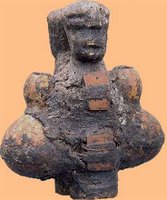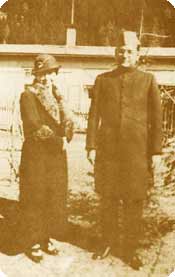The below stated are not my views but I do agree with some of the commentary.Mohandas Karamchand Gandhi was born in 1869 in a stately and handsome three-storied home in Porbandar, grandson of the chief administrator of the small Princely State in coastal Gujarat. Acknowledging that he was born into a family of politicians, always involved in secret alliances and mutual promotions, in one letter, he wrote: "I knew then, and know better now, that much of my father's time was taken up in mere intrigue." In another letter to his nephew, Chaganlal, he acknowledged the notoriety of his political family: "...that is, we are known to belong to a band of robbers". It is to Gandhi's credit that he saw his family for what it was, and attempted to transcend it's narrow Modh Bania outlook; but often, subconsciously learned behavior dies hard. The tendency towards backroom wheeling and dealing did not entirely escape Gandhi himself as he rose to become the Indian National Congress's most influential political leader. (See Collected Works, vol. 24, p.170, vol. 12, p.381)
Although most biographies of Gandhi focus on Gandhi's political career after he returned from England in early 1915, and begin with his involvement in the Civil Disobedience Movement from the early 1920s, it is important to note that Gandhi arrived on the National Scene rather late, and in the first half of his political life was considerably beholden to the Raj. At a time when literacy in British India was barely 8%, Gandhi enjoyed the rare option of studying in Britain and spent the years 1888-1893 in London before taking employment in South Africa. Although Gandhi became politically active in South Africa, and led 'Satyagrahas' against unjust laws, Gandhi was hardly yet an anti-imperialist radical or revolutionary. In fact, in 1914, he was still very much in awe of the British empire, and Martin Green in his biography of Gandhi describes his state of mind as follows: "When Gandhi left South Africa, he still believed in the British empire. though tentatively. "Though Empires have gone and fallen, this empire may perhaps be an exception....it is an empire not founded on material but on spiritual foundations....the British constitution. Tear away those ideals and you tear away my loyalty to the British constitution; keep those ideals and I am ever a bondsman"." (See Martin Green, Gandhi: Voice of a New Age Revolutionary, p. 208)
It is especially notable that at the age of 45, Gandhi saw in the British empire a "spiritual foundation" - a sentiment many in the Indian Freedom Movement would have found astounding, even nauseating. As early as 1884, the most advanced Indian intellectuals were already quite clear that British rule in India was built on a foundation of economic pillage and plunder - and was devoid of any high social or moral purpose. "Nadir Shah looted the country only once. But the British loot us every day. Every year wealth to the tune of 4.5 million dollar is being drained out, sucking our very blood. Britain should immediately quit India.'' So wrote the Sindh Times on May 20, 1884, a year before the Indian National Congress was born and 58 years before the ''Quit India'' movement of 1942 was launched.
But in 1914 Gandhi was quite far removed from the most radical elements of the Indian Freedom Movement. In 1913, poor emigrant farmers from the Punjab in California launched the Ghadar Party and released their manifesto calling for complete independence from British Rule. Several years earlier, before his internment, Tilak had cogently described the Indian condition under British colonial occupation as being utterly ruinous and degrading. Tilak, Ajit Singh, Chidambaram Pillai and their associates in the National Movement saw few redeeming qualities in the British dispensation, and saw colonial rule as being entirely inimical to India's progress, asserting that the contradictions between the British oppressors and the Indian people were completely irreconcilable.
Although Gandhi was critical of specific aspects of colonial rule, in 1914, his general outlook towards the British was more akin to that of the loyalist Princes than the most advanced of India's national leaders. Particularly onerous was his support of the British during World War I. Even as the Ghadar Party correctly saw in WWI a great opportunity for India to deepen its opposition to the British, and liberate itself from the colonial yoke, Gandhi instead tried to mobilize Indians on behalf of the British war effort. Although many biographers of Gandhi have studiously omitted making any mention of such dishonorable aspects of Gandhi's political life, Martin Green makes a brief reference to Gandhi's attitude towards WWI when he was in England: "To return to London in wartime: Gandhi quickly raised his ambulance corps amongst the Indians in England. As before, he had offered his volunteers for any kind of military duty, but the authorities preferred medical workers". Martin Green also observes: "Many of his friends did not approve the project. Olive Schreiner, who was in London, wrote him that she was struck to the heart with sorrow to hear that he had offered to serve the English government in this evil war - this wicked cause". (See Martin Green, Gandhi: Voice of a New Age Revolutionary, p. 247)
Gandhi's ideas on non-violence did not then extend to the British Imperial War, and upon his return to India in 1915 attempted to recruit Indians for the British War effort. Gandhi's position echoed that of the Maharajas, many of whom (like the Maharaja of Bikaner) played a pivotal role in supporting the British, both in terms of propaganda and providing troops. Gandhi's attitude towards the empire emerges quite clearly from this statement of Martin Green: "Gandhi himself had twice volunteered for service in this war, in France and in Mesopotamia, because he had convinced himself that he owed the empire that sacrifice in return for it's military protection." (See Martin Green, Gandhi: Voice of a New Age Revolutionary, p. 267)
Gandhi's role in championing the British War effort did not however go unchallenged. At a time when Gandhi was still addressing "War Recruitment Melas'', Dr. Tuljaram Khilnani of Nawabshah publicly campaigned against War Loan Bonds. When Gandhi sought election to the AICC from Bombay PCC, the delegate from Sindh opposed his election in view of his support to the British war effort. The Ghadar Party was especially acerbic in it's criticism of Gandhi and other such political leaders in the Congress who had not yet been able to sever their umbilical chord to the British Raj.
But even as Gandhi was able to justify in his mind support for the imperial war, his attitude towards the revolt of Chauri Chaura (1921) brought about a very different and very harsh assessment. Labeling it a crime, he wrote thus: "God has been abundantly kind to me. He has warned me the third time that there is not yet in India that truthful and non-violent atmosphere which and which alone can justify mass disobedience....which means gentle, truthful, humble, knowing, never criminal and hateful. He warned me in 1919 when the Rowlatt Act agitation was started. Ahmedabad, Viramgam, and Kheda erred. Amritsar and Kasur erred. I retraced my steps, called it a Himalayan miscalculation, humbled myself before God and man, and stopped not merely mass civil disobedience but even my own which I knew to be civil and non-violent" . (See Collected Works, vol. 22, p.415-21)
Gandhi's Chauri Chaura decision created deep consternation in Congress circles. Subhash Chandra Bose wrote: "To sound the order of retreat just when public enthusiasm was reaching the boiling point was nothing short of a national calamity. The principal lieutenants of the Mahatma, Deshbandhu Das, Pandit Motilal Nehru and Lala Lajpat Rai, who were all in prison, shared the popular resentment. I was with the Deshbandu at the time, and I could see that he was beside himself with anger and sorrow." (quoted from The Indian Struggle, p.90)
To describe Gandhi's decision as a "national calamity" was indeed right on the mark. To lay such stress on non-violence - that too only three years after he had been encouraging Indians to enroll in the British Army was not only shocking, it showed little sympathy towards the Indian masses who against all odds had become energized against their alien oppressors.
For Gandhi to demand of the poor, downtrodden, and bitterly exploited Indian masses to first demonstrate their unmistakable commitment to non-violence before their struggle could receive with Gandhi's approval (just a few years after he had unapologetically defended an imperial war) was simply unconscionable. Clearly, Gandhi had one standard for the Indian masses, and quite another for the nation's colonial overlords. But this was not to be the first occasion for Gandhi to engage in such tactical and ideological hypocrisy.
Although Gandhi's defenders may disagree, not only were Gandhi's ideas on non-violence applied very selectively, they were hardly the most appropriate for India's situation. At no time was the British military presence in India so overwhelming that it could not have been challenged by widespread resistance from the Indian masses. Had Gandhi not called for a retreat after Chauri Chaura, it is likely that incidents such as Chauri Chaura would have occurred with much greater regularity - even increasing in frequency and intensity. This would have inevitably put tremendous pressure on the British to cut short their stay. As it is, British administrators were constrained to send back British troops as soon as possible, because many clamored to return after serving for a few years in India. Had India become too difficult to control, mutinies and dissension in the royal armies would have occurred more often, and the British would have had to cut and run, probably much sooner than in 1947.
Some critics saw in Gandhi's Chauri Chaura turnaround as indicative of his deep fear and distrust of the Indian masses - that Gandhi feared the spontaneous energy of the poor and the downtrodden more than the injustice of British rule. Certainly, the conservatism of Gandhi's tactics lends credence to such views. As late as 1928, Gandhi resisted Nehru and Bose, and campaigned for the rejection of a resolution calling for complete independence at the session of the Indian National Congress. And unlike other leaders in the freedom struggle, Gandhi often entertained false hopes about the British. In a 1930 letter, Motilal Nehru chided Gandhi for resting his hopes on the Labor Government and the sincerity of the Viceroy.
In much of Motilal Nehru's correspondence with his son, (and with others in the Congress), there are expressions of frustration with Gandhi's tendency towards moderation and compromise with the British authorities and his reluctance to broaden and accelerate the civil disobedience movement. There are also references in Motilal Nehru's letters to how large contributions from the Birlas were enabling certain political cliques (led by Madan Mohan Malviya - a close confidante of Gandhi) to "capture" the Congress. That Gandhi was close to the Birlas is now widely acknowledged, and it is not unlikely that his conservatism was either encouraged by them, or may have been coincidental but was compatible with their desire for restrained and moderate resistance to the British.
Motilal Nehru and Subhash Chandra Bose both complained of Gandhi's tendency to ignore party resolutions when they went against his wishes, and to work with cliques rather than consult and cooperate with all party members. In a letter dated March 28, 1939, from Manbhum, Bihar - Bose complained bitterly to Nehru of Gandhi's quiet campaign of non-cooperation with him. Bose had just won the Presidency of the Indian National Congress, defeating Gandhi's chosen nominee, Dr Pattabhi. At first, Gandhi had tried to talk Bose out of running for the post, and tried to work out a backroom deal for Dr Pattabhi's ascension (as he had done on many earlier occasions). But Bose was determined to seek the mandate of Congress activists, and won by a handsome margin in an election where the official machinery of the Congress had put all its weight behind Gandhi's hand-picked nominee.
Bose's historic election signified the mood of the Indian masses, who were becoming increasingly impatient with Gandhi's tepid nationalism. Bose had always strived to accelerate the freedom struggle, and the mass of Congress Party workers appreciated his sincerity and unswerving commitment to the national cause. In many ways, he was the best person to lead the Congress, with intellect and vision that exceeded Gandhi.
But Gandhi, along with Patel and Nehru formed a tactical block against Bose, and prevented him from functioning effectively as leader of India's preeminent national organization. In vain did Bose make his case with Nehru, who remained unmoved, and eventually, it led to Bose having to quit the Congress, and organize outside it's tedious confines.
One of the most problematical aspects of Gandhi's philosophical disposition was his emphasis on matters religious over practical. In a 1918 speech concerning India's future he espoused a position that truly secular Indians ought to find rather troubling: "I feel that India's mission is different from that of other countries, India is fitted for the religious supremacy of the world....India can conquer all by soul-force". (See Collected Works, vol. 14, p.53)
To this day, Western analysts continue to evaluate India as though its only contribution to world civilization is in matters of religious exotica and spirituality. And many Indians unquestioningly accept such one-sided formulations. But to pigeon-hole India as this exotic land - full of religious devotion and piety does great injustice not only to India's rich history of secular pursuits, but it also leaves many rational, scientific and technologically-oriented Indians bereft of any philosophical affirmation and intellectual leadership.
On more than one occasion, Gandhi would begin with statements such as "God has warned me", or "...spoken as such.....". Coming from any ordinary person, such claims would normally be viewed with great suspicion and skepticism because they can only be accepted on faith, never independently verified. In fact, any ordinary person who claimed as often to have a 'hotline' to 'God' might even be seen as a lunatic, as someone prone to hallucinations. But from Gandhi, such utterances were quietly tolerated or accepted.
That Gandhi espoused such religious-centric views is not surprising considering the milieu in which he was raised and educated. Most British-educated Indians were kept completely ignorant of India's rich history of rational thought and (pre-industrial) scientific endeavour. So it was inevitable that Indians would seek inspiration from religious texts - Hindus from the Gita, Muslims from the Quran, Sikhs from the Granth Sahib. But unlike Tilak who derived from the Gita, a call to action, a call to rise against injustice, Gandhi found in the Gita an appeal to pacifist idealism. In a world that was rife with violence, Gandhi's insistence on non-violent purity was, in practical terms, an exercise in infantile futility. Not only did it delay the onset of freedom, it led to particularly disastrous consequences during partition, and in Kashmir.
Whereas the Muslim League was armed, the Congress was not and entirely dependant on the British police and military apparatus. When the partition riots first began in West Punjab and East Bengal, the Congress had no means to defend the hapless victims. Being unable to prevent the slaughter and rape, or protect the stream of Hindu and Sikh refugees, it lost the moral authority to prevent a communal backlash in India. A similiar situation prevailed in Kashmir. The Muslim League sent in its armed hooligans even as Kashmir's most popular political party, the National Conference had decided to throw in its lot with secular India. In Baluchistan and the Frontier Province, majority sentiment was in favor of unity with India. Had the Congress been armed, it could have at least held out for for a better deal, and at least some of the horrors of partition may have been averted.
There were many other serious incongruities in Gandhi's world view. As one reads through Gandhi's letters and sundry writings, time and time again, he uses the term 'Dharma 'in the context of how Indians should behave vis-a-vis the British, and the term "right" in the context of what the British could do to their Indian subjects. In Gandhi's ethical framework, not only did the conquered have very limited rights, they were burdened with all types of duties under the rubric of 'Dharma '. Conquered Indians were repeatedly lectured on how they must be concerned with the highest morality when dealing with their British oppressors - even as the British conquerors were little restricted by any 'Dharmic' pressures, and enjoyed the ultimate authority to take away the life of Indians they chose to put on trial for 'sedition'.
In all other theories of democratic liberation, ethical and moral codes emanated from one essential principle - which is the fundamental right of enslaved people to be free from alien exploitation. But in Gandhi's moral framework, the need of the Indian masses to liberate themselves from a brutally unjust colonial occupation did not come first, it was subject to all kinds of one-sided conditionalities.
For instance, in the context of Bhagat Singh's hanging, even as Gandhi condemned the British government, he observed: "The government certainly had the right to hang these men. However, there are some rights which do credit to those who possess them only if they are enjoyed in name only." (See Collected Works, vol. 45, p.359-61, in Gujarati)
Whether Gandhi was confusing the term "right" with the term authority or might, or he actually granted the colonial government the "right" to execute Indian freedom fighters is hard to tell. But in general, it appears that Gandhi had not worked out in his mind the true essence of natural human rights, and desirable human duties in a civilized society. Nor had he come to realize that in any democratic dispensation, governments cannot be assigned any inherent rights, for they are only the proxies of the people who elect them, and they only have duties and obligations to ensure the rights of the people, and to prevent the exercise of those individual rights that might violate, restrict or inveigh on the rights of others.
In the context of Bhagat Singh, the British government was under no popular obligation to execute him. On the contrary, his actions had widespread support, and there were fervent appeals for the commutation of his sentence. In such a context, Gandhi could have only spoken of British authority - and that too a stolen and usurped authority to execute Bhagat Singh. Had he been truly moved against Bhagat Singh's death sentence, he would have spoken of how the British were able to execute him only because of their military might - that their action had no ethical or moral sanction.
A true revolutionary - (such as Bhagat Singh) would not have granted the exploitative colonial regime any "rights" whatsoever. In fact, it would have been the right of the Indian revolutionary to resist colonial rule by any means necessary. If Indians obeyed British orders, it was only out of practical necessity, out of an instinct to survive. But if some were prepared to risk their lives in confronting the British military occupation, it was their inalienable right to do so. Indians had duties and obligations towards each other, but none to the British occupiers and exploiters. From a revolutionary, moral, ethical, or national perspective, there was no necessity to grant the British colonial authorities any rights whatsoever, because their very presence was illegal and obtained without the democratic consent of the Indian masses. Indians, therefore, had no moral duty, or 'Dharma', obliging them towards obeying their orders, or respecting the lives of the Britishers who had occupied Indian territory by force.
But Gandhi was never completely able to overcome a deeply ingrained tendency towards tolerating or accepting the "rights" he saw intrinsically bound with authority figures. In the feudal order that Gandhi was born in, the masses had no inherent rights, only duties towards the sovereign. And Gandhi was never able to completely reject this iniquitous paradigm. He was never fully able to complete the transition to a democratic order in which citizens enjoyed inalienable rights in addition to bearing duties towards each other. He did not fathom that in a democratic society, the role of the state was to ensure the rights of the people, not to exercise any arbitrary hegemony over them. Moreover, in a democratic state, the masses could not be burdened with unnecessary duties, only those that obliged them to respect the rights of others, and required them to provide services in exchange for what they received from the state, or others in society.
While many of the qualities Gandhi sought to elicit from the masses were commendable and desirable qualities to strive for - one could not make such qualities conditions for granting the masses certain fundamental rights - such as freedom from hunger, homelessness and exploitation. And if the poor masses were enjoined to be more noble in character, then such requirements also had to be made mandatory for authority figures.
In these (and other such) ways, Gandhi's formulations were theoretically and practically inadequate.
While there will always be admirers of Gandhi, intimate contact with his record reveals him to be a seriously flawed leader, popular more due to the particular conditions and circumstances of colonial (or post-colonial) India (and his unwavering leadership during the Quit India Movement), rather than the visionary or enlightened nature of his general tactics and formulations. The India of the future might well need to look beyond the myth and mystique of "Mahatma Gandhi" if it hopes to build a more just and harmonious order.

































